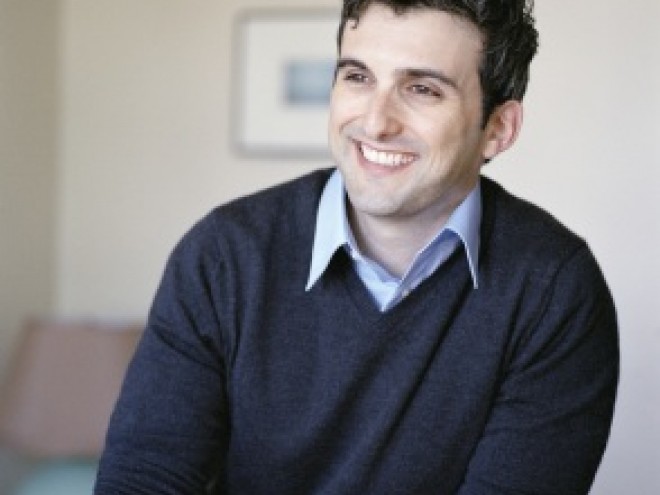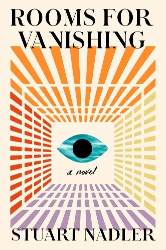We prompted this year’s Sami Rohr Prize awardees to write about “how they came to write their book.” Over the next several weeks, we’ll share their responses. Today, Stuart Nadler discusses how he came to write his short story collection The Book of Life.
 I wrote all but one of the stories in The Book of Life while I was at the Iowa Writers’ Workshop. I hadn’t gone to Iowa thinking I would leave with a collection. In truth, I hadn’t even realized I was working on a collection until most of these stories were finished, and I recognized, looking over everything, that there was so much common ground in the work, places where the stories touched and diverged, characters who shared the same anxieties and concerns. As a reader, what I love most about short story collections is that, invariably, they represent in some way an author’s preoccupations and obsessions. And this, surely, was true about me and the stories in this book.
I wrote all but one of the stories in The Book of Life while I was at the Iowa Writers’ Workshop. I hadn’t gone to Iowa thinking I would leave with a collection. In truth, I hadn’t even realized I was working on a collection until most of these stories were finished, and I recognized, looking over everything, that there was so much common ground in the work, places where the stories touched and diverged, characters who shared the same anxieties and concerns. As a reader, what I love most about short story collections is that, invariably, they represent in some way an author’s preoccupations and obsessions. And this, surely, was true about me and the stories in this book.
A good deal of The Book of Life is about family — fathers and sons, brothers, husbands and wives — and about the sins people commit against the people they love most. Invariably, I’ve come into the lives of these characters at their very worst moments. In one story, a father reacts poorly to his son’s sudden interest in Judaism, while trying to exist in an open marriage. In another, a father takes his son to meet his own estranged father, a man he’s pretended has been dead for decades. I was on a treadmill at the gym when the idea for this story came to me. It’s the only time this has ever happened: the whole story, in its entirety. In “Catherine and Henry” a woman, unsure of her boyfriend’s faithfulness, tests him with a prostitute. This was the story I was working on when I came to the Workshop. I’d end up rewriting it for six years before it was published.
I was already fixated on the central ideas in this book by the time I arrived in Iowa: sin and redemption and the way these transgressions intersect with religion, or a lack of religion. I have never been particularly observant, but that first autumn, when the High Holidays arrived, I found myself taking bread down to the Iowa River to celebrate tashlich. In Hebrew, tashlich means “casting off.” It’s a simple exercise, in which you take pieces of bread and throw them into a river, an act that is supposed to symbolize casting off a year’s sins. The idea comes from the prophet Micah, who says that God “will cast all our sins/Into the depths of the sea.” I had never done this before, or even heard of the practice before I did it, and, to be entirely truthful, I haven’t done it since. The title of my book comes from the part of the High Holiday liturgy that has always been my favorite: On Rosh Hashanah It is Written, On Yom Kippur It is Sealed. The idea of a book of life has always fascinated me, as has the generous notion that its pages are opened fresh every year, and that one’s private sins can be forgiven communally.
This—On Rosh Hashanah It is Written, On Yom Kippur It is Sealed—was the initial title for the first story in my book. In it, a man has an affair with his best friend’s grown daughter. I wrote the first draft of this story over the course of a frigid week in February. In many ways, the story was a breakthrough. Here was what I had been looking for. How people react when they’re tempted. How people suffer at their missed opportunities at love. How they seek out their faith, even if, as it is true for almost all of my characters, they don’t know or remember how to connect with that faith. The rest of the stories came quickly after that, and when I left Iowa that spring I had a bigger, baggier version of what this book would become. In the end, putting the book together was a process of assembly, and what remained after all the cutting and discarding and revision was the core of that initial preoccupation of mine — these characters who are cheaters and adulterers and liars and bad parents, bad brothers, bad friends, all of them trying to negotiate theirs sins and their guilt.
Stuart Nadler is a recipient of the 5 Under 35 award from the National Book Foundation. A graduate of the Iowa Writers’ Workshop, where he was awarded a Truman Capote Fellowship and a Teaching-Writing Fellowship, he was also the Carol Houck Smith Fiction Fellow at the University of Wisconsin. He is the author of Wise Men, and the story collection The Book of Life.Stuart Nadler is a recipient of the 5 Under 35 Award from the National Book Foundation, and the author of Wise Men, The Inseparables, and The Book of Life. His work has been named a Kirkus Best Book of the Year, a Barnes & Noble Discover Great New Writers Selection, and an Amazon Book of the Year. He is a graduate of the Iowa Writers’ Workshop, where he was a Truman Capote Fellow and a Teaching-Writing Fellow. He is on the faculty of the Bennington Writing Seminars. He lives in New England.



